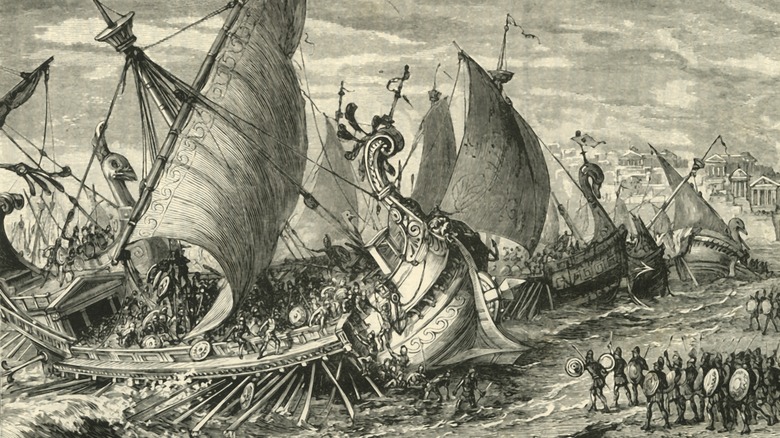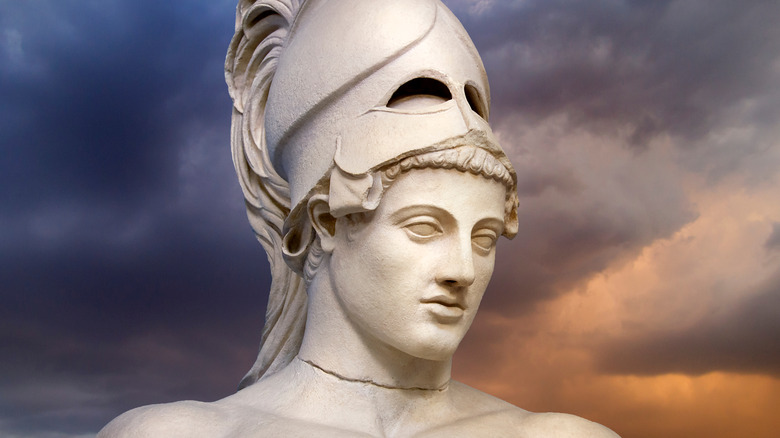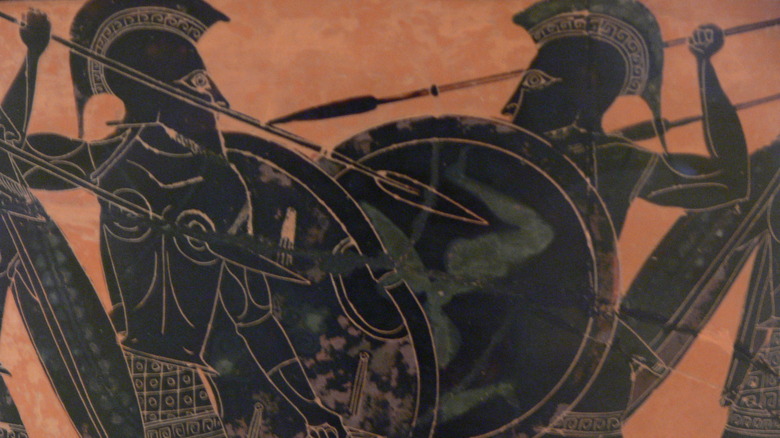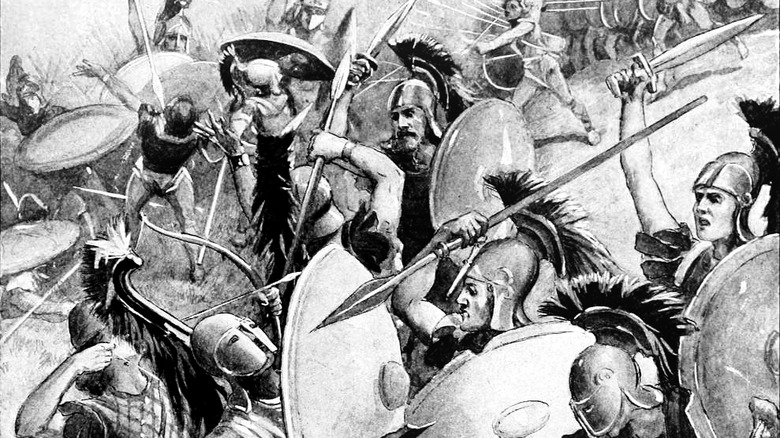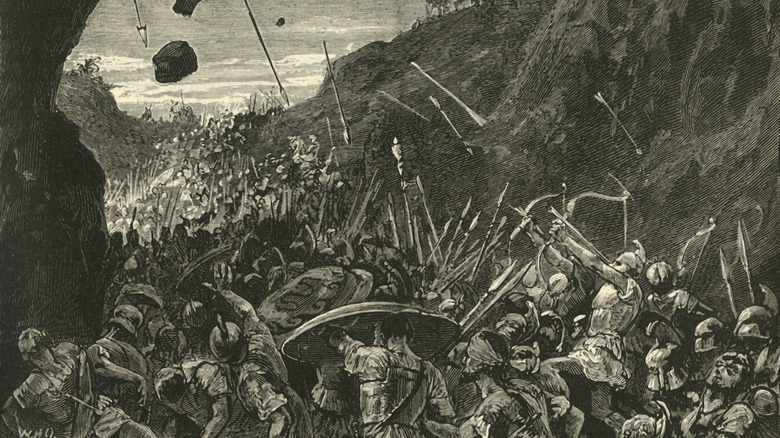How The War Between Sparta And Athens Led To The End Of Greece's Golden Age
During the fifth century B.C., in the area we now know as Greece, nothing was more life-altering or world-changing than the Peloponnesian War. The war between the city-states of Athens and Sparta lasted 27 years, as UPI notes. It unfolded in a series of drawn-out land and sea-based battles, raids, and sieges using never-before-seen-military strategies, writes World History. Death counts, especially among citizens, were extreme. Tactics included starving cities and destroying crops. Worse, in the early years of the war, a plague wiped out large swaths of the population, including an essential military leader.
It is challenging to find heroism or a moral advantage in this war. Instead, the exchange was long, gruesome, and destructive. The war, lasting from 431 to 405 BCE, permanently altered the political and cultural balance of the region, as History notes. Athens' surrender to Sparta ended the city-states' century-long cultural and political dominance we now call ancient Greece's Golden age. The war's end led to the brief rise of Sparta, which soon ceded power to Persia, and eventually the Macedonian Empire.
Greece's Golden Age still reverberates throughout history, though it only lasted about 100 years. Within that time frame, you can find many of the foundational ideas, historical figures, and artists at the core of western civilization, according to the Canadian Museum of History.
Pericles and Greece's Golden Age
Greece's Golden Age began when the vastly outnumbered Athenians defeated the Persian army says the Canadian Museum of History. This impressive victory motivated the people of Athens and fueled an ethos of achievement beyond all odds. This culture of intense competition and productivity led to innovations in many areas of society.
For example, this era saw the rise of drama and the theater arts with such playwrights as Aeschylus and Sophocles. During this time, writers and historians Herodotus and Thucydides laid the foundation for studying and documenting history as we know it. This climate of productivity and progress also gave rise to great contributors to philosophy, sculpture, and medicine, such as Socrates, Phideas, and Hippocrates, respectively. The era's numerous and influential developments tempt some historians to call this period "The Greek Miracle." However, its achievements are purely human and grounded in the time's political, cultural, and economic circumstances.
According to the Canadian Museum of History, some call the Golden Age of Greece the Age of Pericles. Though Pericles lived through only the first couple of years of the Peloponnesian War, his influence is no less significant. Thanks to his influential parents and strong public speaking skills, Pericles rose to the elected position of "strategos," essentially a top general. Under his leadership, Athens invested in the arts and saw significant social progress.
Tensions brew between Athens and Sparta
Pericles was the embodiment of his enlightened city. He oversaw the building of the Acropolis' famed Temple of Nike and Parthenon and personally funded one of Aeschylus' plays. Pericles also kept some of Athens's leading thinkers and artists in his social circles, including the sculptor Phidias and the playwright Sophocles, not to mention his infamous romance with Aspasia, a scholar of rhetoric and Socrates's teacher, according to History.
Yet, since Athens defeated the Persians, tensions brewed between Athens and Sparta, and fears of future Persian attacks inspired both city-states to make strategic alliances. Athens first began gathering allies, to prevent more attacks like those they faced in the Persian war, leading to the formation of the Delian League, or Athenian League, writes World History. And, most of the island regions in the Aegean sea likely made up the league's membership, according to Britannica. Alternatively, the Spartans led the Peloponnesian League, which spread from Corinth to the Peloponnesian peninsula and central Greece.
During this time, Athens grew in both military strength and wealth. It also embarked on an ambitious project to rebuild its extensive walls that protected Athens' lucrative and vital harbor. All of this progress made Sparta suspicious and worried, coupled with Sparta's tenuous alliance with Corinth, the Spartans became worried that Athens would eventually draw Corinth to their side, explains World History.
War breaks out between Athens and Sparta
A war between Athens and Sparta was not new. A few decades earlier, the two powers fought each other in a conflict called the First Peloponnesian War. In 445 B.C., after the fighting stopped, the city-states agreed to the Thirty Years' Treaty, writes Britannica. Little did they know that Athens would soon break it.
The Peloponnesian War began through tensions between allies of Athens and Sparta. According to Columbia University, Corinth (an ally of Sparta) had a dispute with Corcyra — modern-day Corfu. Athens agreed to side with Corcyra in a defensive partnership. To many, Athens' decision to side with Corcyra violated the Thirty Years' Treaty, says Britannica. Suddenly the two most formidable Grecian powers were at odds via their allies. Then, in 431, Thebes, allied with Sparta, attacked Plataea, allied with Athens, and the war officially broke out.
As explained by History, Athens had a skilled naval force that Pericles used to his advantage. When the Spartans set their sights on Attica, a region surrounding Athens, Pericles evacuated Attica via boats. When the Spartans arrived, they had only an empty land to invade. Pericles brought the Attica residents behind Athens' fortified walls. In this way, he could protect and feed his people using the city's ports. At first, this mismatched warfare style between the superior land-based Spartan army and Athens' strong navy gave Athens the advantage.
Peace of Nicias: A Fleeting Truce
The first decade of the war continued with the Spartan attacks on the Athenian countryside. Still, Pericles refused to engage, seeking out distant battlefronts via the sea, writes History. The first decade of The Peloponnesian War is called the Archidamian War after the king of Sparta that first laid siege at Attica, explains Columbia University.
The Athenian upper hand changed when a plague swept through the region, killing nearly two-thirds of Athens' population with Pericles among the victims. Suddenly Athens was without its unifying leader. At the same time, Sparta used the call "Freedom for the Greeks" to raise support for their war efforts. They framed the conflict as liberation for those in the Peloponnesian League, who saw themselves as oppressed by the Athenians. Though weakened, Athens remained strong enough to drive Sparta to ask for peace, says Columbia University. Soon, the two warring parties agreed to a 50-year truce in which they would defend each other, writes National Geographic.
The treaty, called the Peace of Nicias, was named after the Athenian who arranged the agreement (via History). However, according to National Geographic, the deal fell apart after six years when Athens re-ignited their aggressions.
The end of Greece's Golden Age
The Peloponnesian War kicked off again in 415 B.C. through a series of blunders. An Athenian defector told the Spartans that Athens planned to attack Italy. At the same time, an ally of Athens in Sicily reached out for help against forces from Syracuse. The Athenians came to their ally's aid, and the Spartans sided with Syracuse, writes History. The Athenians lost the battle, signaling a change for the once-powerful city-state. Even so, the war continued for nearly a decade.
Over the years, Sparta, knowing Athens' advantage at sea, strengthened their naval forces, says National Geographic, and at the same time, Persia began funding the Spartan war efforts (per Columbia University). The conflict came to a head at the battle of Aegospotami. General Lysander led the Spartans to victory with strengths on land and at sea, as History notes. The Athenians surrendered, and their defeat officially ended both the Peloponnesian War and the Golden Age of Greece (via National Geographic).
A short-lived Spartan rule followed, seeking out military conquest that led to nearly another decade of war, known as the Corinthian Wars. A century later, both regions submitted to the kingdom of Macedon under King Phillip II, according to History. Greece was unified for the first time as one political entity, as the League of Corinth, sometimes called the Hellenic League. A generation later, Phillip's son Alexander the Great realized his father's dream of conquering all of the Persian Empire.
